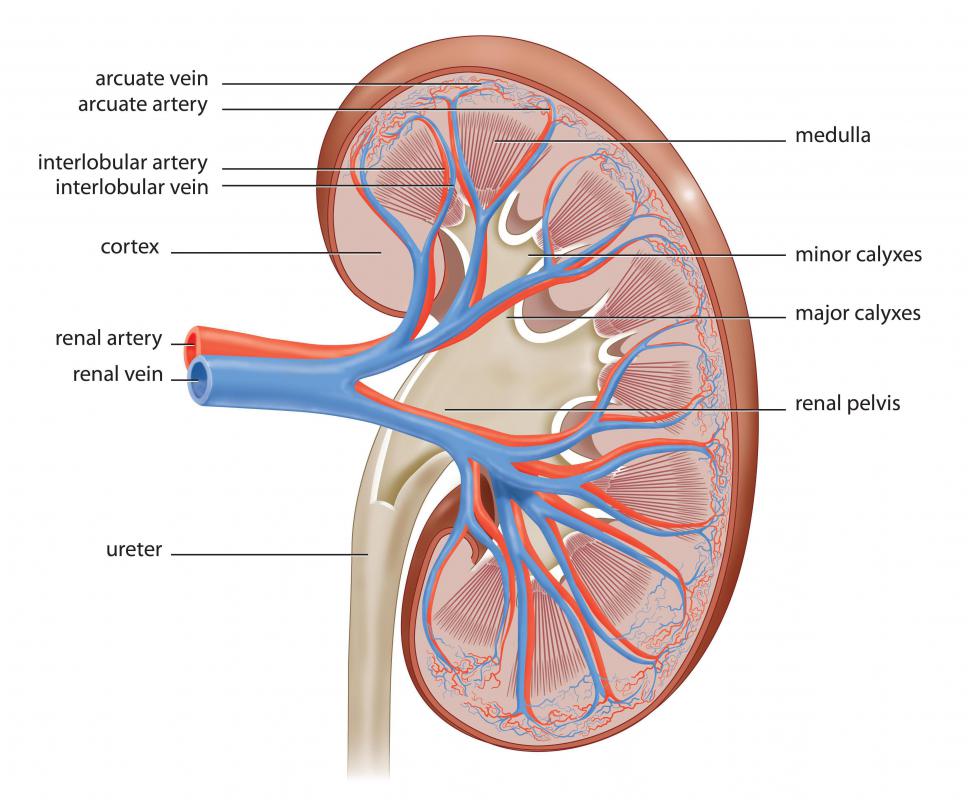At WiseGEEK, we're committed to delivering accurate, trustworthy information. Our expert-authored content is rigorously fact-checked and sourced from credible authorities. Discover how we uphold the highest standards in providing you with reliable knowledge.
What is Albuminuria?
Albuminuria is a disorder in which the blood protein albumin is present in urine. Normally, the kidneys filter out proteins and they remain in the blood. Their presence in urine can be due to kidney damage. A test for albuminuria is frequently used to diagnose kidney disorders in people prone to kidney problems, such as diabetics and people with high blood pressure.
Healthy kidneys filter waste products out of the blood, leaving behind large molecules, such as albumin — the major protein in human blood. Most proteins are too large to go through the filters in the kidneys and into the urine. If the kidneys are damaged, however, there can be a loss of protein in urine. This protein build-up is known as albuminuria or proteinuria.

The traditional way of testing for albuminuria involved measuring the amount of albumin that had built up in urine collected over 24 hours. Now, however, it is possible to test for this protein using a single urine specimen. This has facilitated the use of a test for albumin in urine as a common screen for kidney function. This test is particularly valuable since there are no symptoms for this disorder in its early stages.

There are different degrees of albuminuria, all of which are diagnosed based on the amounts of protein present in the urine. Since the amount of albumin may vary, depending on the degree of it in the urine, albumin concentrations are usually tested along with the levels of the compound creatinine. This chemical is produced as a waste product from the use of muscles. Health professionals examine the ratio of albumin to creatinine in order to diagnose albuminuria.

This ratio is generally below 3.5 milligrams per millimole (mg/mmol) for women, and 2.5 mg/mmol for men. Levels of greater than 300 mg of albumin constitute a diagnosis of albuminuria. Lower amounts constitute a condition known as microalbuminuria, an earlier stage of kidney dysfunction. Values of 30 to 300 mg are considered microalbuminuria if the test repeats in this range twice. If albumin is detected, further evaluations will be performed to determine the extent of kidney damage.
Diabetics are tested yearly for microalbuminuria, since this is often the first indication of chronic kidney disease. With Type I diabetes, over time, this disease will generally progress to kidney failure, requiring dialysis or a kidney transplant. Type II diabetics do not always have as severe a prognosis for kidney problems. Drugs known as ACE inhibitors or Angiotensin receptor blockers (ARB) are used to treat chronic kidney disease, and ACE inhibitors are often given preventatively to diabetes patients. Keeping blood sugar and blood pressure under control can do a great deal to minimize the complication of kidney disease due to diabetes.
High blood pressure can also cause chronic kidney disease, which, if not controlled, can lead to kidney failure. There is also a great deal of variation in the susceptibility of people to kidney disease based on their ethnic backgrounds. For instance, African Americans are prone to kidney damage from only moderately high blood pressure levels. Ethnic groups at risk for albuminuria include African Americans, Latinos, Native Americans, and Pacific Islanders. Those who are overweight and older also have a higher risk for this disorder.
AS FEATURED ON:
AS FEATURED ON:













Discuss this Article
Post your comments